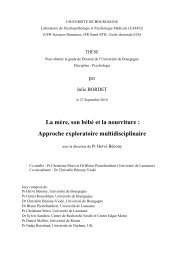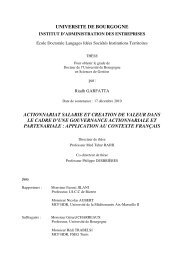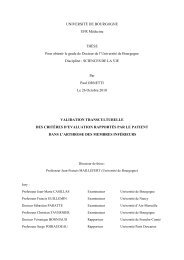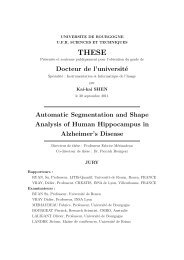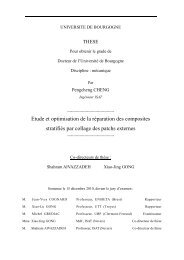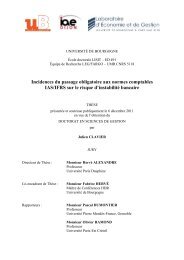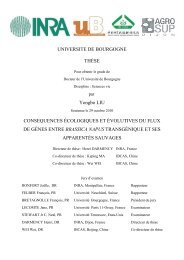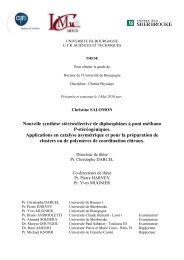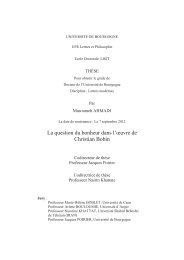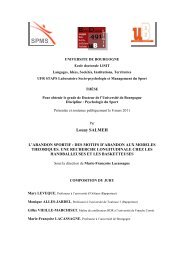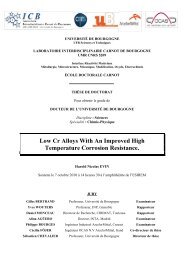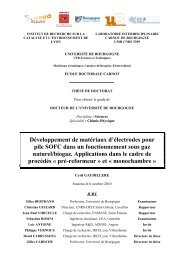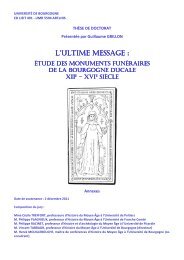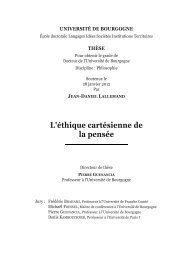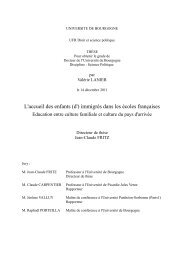- Page 1 and 2:
Higher education in Asian countries
- Page 4 and 5:
ii Dedicated to my parents
- Page 6 and 7:
ii 3 CONCEPTUAL WORK ..............
- Page 8 and 9:
iv 4.2.3 Europeans in Asia ........
- Page 10 and 11:
vi 5.2 ORGANIZATION FOR ECONOMIC CO
- Page 12 and 13:
viii 5.3.8.1.2.2 The Robert S. McNa
- Page 14 and 15:
Figures x Table 24 The World Bank i
- Page 16 and 17:
xii Abbreviations ADB Asian Develop
- Page 18 and 19:
xiv UNLD United Nations Literacy De
- Page 20 and 21:
2 productivity that has become esse
- Page 22 and 23:
4 Central Commission for Navigation
- Page 24 and 25:
6 and international levels and over
- Page 26 and 27:
1 Presentation of the research 1.1
- Page 28 and 29:
10 tertiary level is less than 15%,
- Page 30 and 31:
12 These hypotheses are general in
- Page 32 and 33:
14 the scope of the study and by de
- Page 34 and 35:
16 Participation observation to ha
- Page 36 and 37:
18 The count of IGO‟s activities
- Page 38 and 39:
20 aims, objectives, priorities and
- Page 40 and 41:
22 important actors at internationa
- Page 42 and 43:
24 capital theory in order to study
- Page 44 and 45:
26 performed by that organization.
- Page 46 and 47:
28 According to Bernoux (1985) “E
- Page 48 and 49:
30 Before World War I, IGOs were mo
- Page 50 and 51:
32 3.3.2 Classification on the basi
- Page 52 and 53:
34 council exercise certain of its
- Page 54 and 55:
3.3.4.1.1 Hybrid character 36 Conve
- Page 56 and 57:
3.4 Theories of International Organ
- Page 58 and 59:
40 translate into loss of powers if
- Page 60 and 61:
3.4.4.1 Neo-institutionalism 42 Neo
- Page 62 and 63:
44 socio-economic development at na
- Page 64 and 65:
46 changing needs and meet the new
- Page 66 and 67:
48 Game theory deals with parties (
- Page 68 and 69:
50 perfect information and imperfec
- Page 70 and 71:
3.5.1.2 Cooperative game 52 In a co
- Page 72 and 73:
54 economic development, national n
- Page 74 and 75:
3.6 Definition of higher education
- Page 76 and 77:
58 between 17 to 20 years and durat
- Page 78:
4 Asia and higher education 4.1 Int
- Page 81 and 82:
1. East Asia: China, Japan, Mongoli
- Page 83 and 84:
65 Similarly in East Asian region a
- Page 85 and 86:
4.3 History of Education 67 Educati
- Page 87 and 88:
69 institutions, financing and fund
- Page 89 and 90:
71 because in these economies the e
- Page 91 and 92:
73 capacity, and for developing oth
- Page 93 and 94:
75 This region is passing through a
- Page 95 and 96:
77 Whereas the average value for As
- Page 97 and 98:
79 is evident from the state polici
- Page 99 and 100:
81 Thailand and Malaysia are the le
- Page 101 and 102:
83 According to the World Bank, wid
- Page 103 and 104:
Source: The University of Texas Lib
- Page 105 and 106: 4.8 Economic Growth and higher educ
- Page 107 and 108: 89 provide objective and effective
- Page 109 and 110: 91 purpose of existence and t three
- Page 111 and 112: 93 general and of human knowledge,
- Page 113 and 114: 95 To approve the draft program sub
- Page 115 and 116: 97 non UN intergovernmental organiz
- Page 117 and 118: 99 The Bureau of Field Coordination
- Page 119 and 120: 101 4. UNESCO Office in Beijing - C
- Page 121 and 122: Chairs And Networks Field Offices 5
- Page 123 and 124: 105 and centers function as capacit
- Page 125 and 126: 107 5.1.1.7.1 International Institu
- Page 127 and 128: 7. Caribbean Development Bank 8. Co
- Page 129 and 130: 111 34. International Association o
- Page 131 and 132: 113 5. Netherlands Organization for
- Page 133 and 134: 115 friendly policies and strategie
- Page 135 and 136: 117 Protocol Instituting a Concili
- Page 137 and 138: 119 In today‟s globalized world i
- Page 139 and 140: 121 and a bridge between research,
- Page 141 and 142: Figure 9 Distribution of UNESCO cha
- Page 143 and 144: 5.1.2.7 Open Distant Education (ODL
- Page 145 and 146: 127 In this regard both organizatio
- Page 147 and 148: 129 At national level UNESCO, throu
- Page 149 and 150: 131 was adopted by WCHE in 1998, to
- Page 151 and 152: 5.1.2.13 Cluster offices 133 A clus
- Page 153 and 154: 2. Jakarta Regional Bureau for Scie
- Page 155: 137 Regional Bureau for Education B
- Page 159 and 160: 141 concerned. It assists in the pr
- Page 161 and 162: 143 5.1.4 UNESCO-Bangkok office rol
- Page 163 and 164: 145 has produced 51 publications on
- Page 165 and 166: 147 In the field of higher educatio
- Page 167 and 168: Summary 149 UNESCO is the heir of I
- Page 169 and 170: 151 policy reforms. APEID is contri
- Page 171 and 172: 5.2.2 History and creation of OECD
- Page 173 and 174: 5.2.3.2 Council 155 Governance stru
- Page 175 and 176: 157 Directorate for Employment, Lab
- Page 177 and 178: 159 Non-Members (CCNM) develops and
- Page 179 and 180: 161 laws against spam. They may als
- Page 181 and 182: 163 5.2.5.1.1 Program for Internati
- Page 183 and 184: 165 students, at age 15, are prepar
- Page 185 and 186: 167 The CELE is actively working to
- Page 187 and 188: 169 33rd session of its General Con
- Page 189 and 190: 171 Phase 2: an exploration of appr
- Page 191 and 192: 173 European Federation for Retirem
- Page 193 and 194: UN Development Group (UNDG) UN Deve
- Page 195 and 196: 177 5.2.8 OECD in the World and its
- Page 197 and 198: 179 Status of the Asian Countries i
- Page 199 and 200: 181 Knowledge based economy and inf
- Page 201 and 202: 183 documents belongs to these cate
- Page 203 and 204: 185 A large part of the OECD‟s ac
- Page 205 and 206: 5.3.1 A glance at the World Bank 18
- Page 207 and 208:
of payments and international reser
- Page 209 and 210:
191 these countries to meet the ter
- Page 211 and 212:
193 by the president of the World B
- Page 213 and 214:
5.3.2 The World Bank 195 The World
- Page 215 and 216:
197 including early childhood educa
- Page 217 and 218:
Member states of: 199 All five WBG
- Page 219 and 220:
201 The European Bank for Reconstru
- Page 221 and 222:
203 transforming and changing in al
- Page 223 and 224:
205 graduate studies that are award
- Page 225 and 226:
207 despite of two economic recessi
- Page 227 and 228:
209 Summary of the total lending in
- Page 229 and 230:
211 education sector where 21% of t
- Page 231 and 232:
213 West Asia comprises of 15 sover
- Page 233 and 234:
215 South East Asia where the Bank
- Page 235 and 236:
217 Several projects successfully
- Page 237 and 238:
219 infrastructure development; fro
- Page 239 and 240:
221 The Independent Evaluation Grou
- Page 241 and 242:
223 countries has achieved 100% GER
- Page 243 and 244:
225 universities. State and institu
- Page 245 and 246:
Malaysia 227 In Malaysia all educat
- Page 247 and 248:
229 primary, secondary and tertiary
- Page 249 and 250:
231 government gave more focus to v
- Page 251 and 252:
233 transform the higher education
- Page 253 and 254:
235 Development (DESD) in 2005, UNE
- Page 255 and 256:
237 The time series data, from 1970
- Page 257 and 258:
239 Present higher education system
- Page 259 and 260:
241 toolkits for teachers and other
- Page 261 and 262:
243 these legal instruments. IIEP i
- Page 263 and 264:
245 partner countries in Asia and n
- Page 265 and 266:
6.3 Response to research questions
- Page 267 and 268:
7 Discussion 249 What is the role o
- Page 269 and 270:
251 development of human capital, w
- Page 271 and 272:
253 In the 1980s the differences be
- Page 273 and 274:
255 certainly today we have had a d
- Page 275 and 276:
7.4 A shift in IGOs’ stance 257 A
- Page 277 and 278:
259 as responsive and high quality
- Page 279 and 280:
261 education. The following table
- Page 281 and 282:
Conclusions 263 The increased numbe
- Page 283 and 284:
265 the countries, for the last two
- Page 285 and 286:
267 Outcomes; quality teaching in h
- Page 287 and 288:
269 Barnett, M., & Press, M. F. (20
- Page 289 and 290:
271 Dincauze, D. F. (2000). Environ
- Page 291 and 292:
273 IIEP-UNESCO. (2010). Strategic
- Page 293 and 294:
275 McLean, I., & McMillan, A. (200
- Page 295 and 296:
277 Powersa, J. B., & McDougall, P.
- Page 297 and 298:
279 The World Bank. (2000). Higher
- Page 299 and 300:
281 UNESCO. (2010). Recognition of
- Page 301 and 302:
283 Yusuf, S. (2007). University-In
- Page 303 and 304:
285 is awarded by an institution of
- Page 305 and 306:
287 identifying, formulating, and i
- Page 307 and 308:
289 Annex II- List of the UNESCO-AP
- Page 309 and 310:
291 20th AAOU Annual Conference: Re
- Page 311 and 312:
1997-1998 293 Regional Conference o
- Page 313 and 314:
Source: Table is based on the data
- Page 315 and 316:
Net enrolment rate. Secondary. All
- Page 317 and 318:
299 School life expectancy (years).
- Page 319 and 320:
301 Educational expenditure by natu
- Page 321 and 322:
303 . Public expenditure per pupil
- Page 323 and 324:
305 Arab and European States Border
- Page 325 and 326:
. 307 Convention on the Recognition
- Page 327 and 328:
309 Higher education UNESCO-Bangkok
- Page 329 and 330:
. . 311 A glance at education Repub
- Page 331 and 332:
. A glance at education Philippines
- Page 333 and 334:
315 A glance at education in India
- Page 335 and 336:
317 A glance at education in Afghan
- Page 337 and 338:
319 A glance at education Syrian Ar
- Page 339 and 340:
Annex VI - List of the UNESCO Chair
- Page 341 and 342:
323 UNITWIN Network on emergency pr
- Page 343 and 344:
325 UNITWIN Network on Economics Te
- Page 345 and 346:
327 Major higher education UNESCO p
- Page 347 and 348:
Résumé L'augmentation du nombre d
- Page 349 and 350:
331 comment, quand et pourquoi ces
- Page 351 and 352:
333 laboratoire d'idées, un produc
- Page 353 and 354:
335 différents. Le bureau de Bangk
- Page 355 and 356:
337 Direction de l'Education de l'O
- Page 357 and 358:
339 spécialisées de l'ONU, dix-se
- Page 359 and 360:
341 Les résultats des activités d
- Page 361 and 362:
L’OCDE 343 OCDE n'est pas puremen
- Page 363:
Author’s introduction Mr. Amjad A



